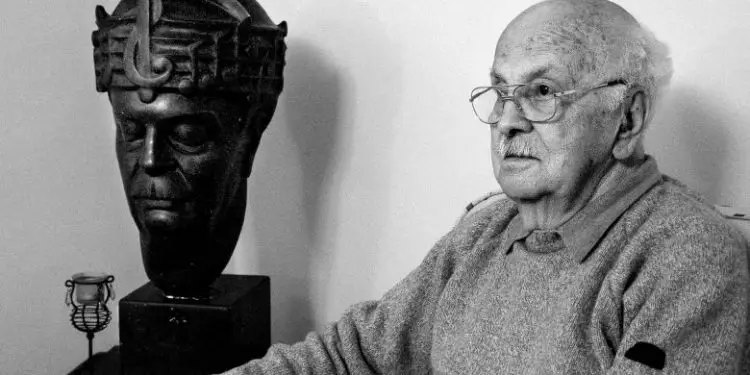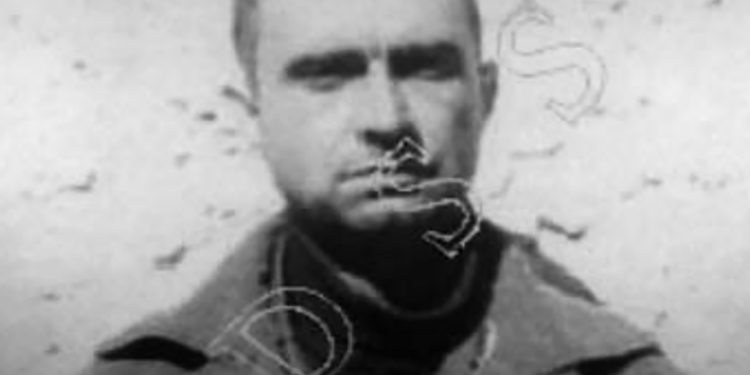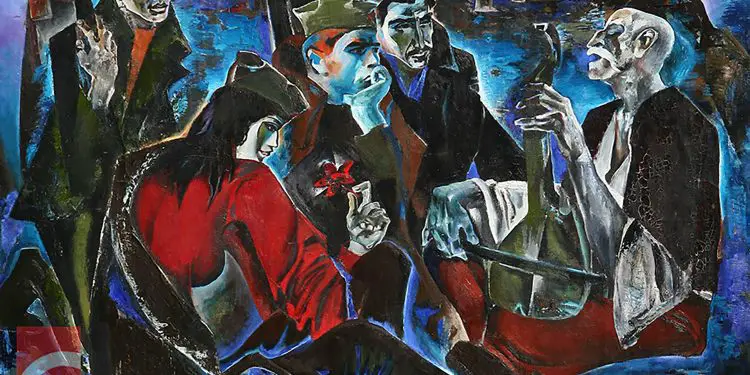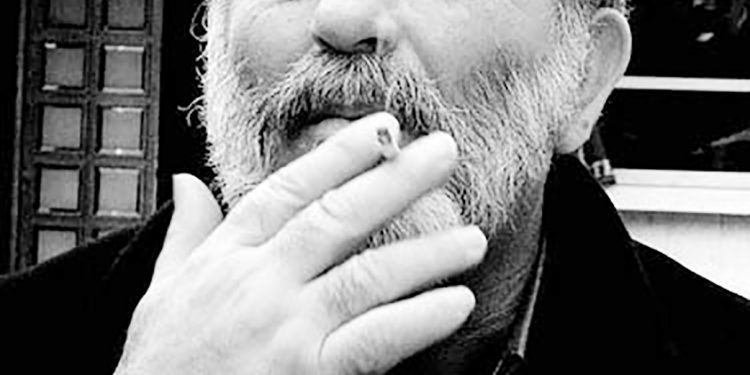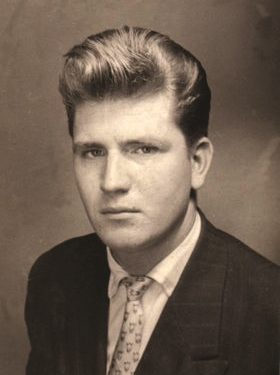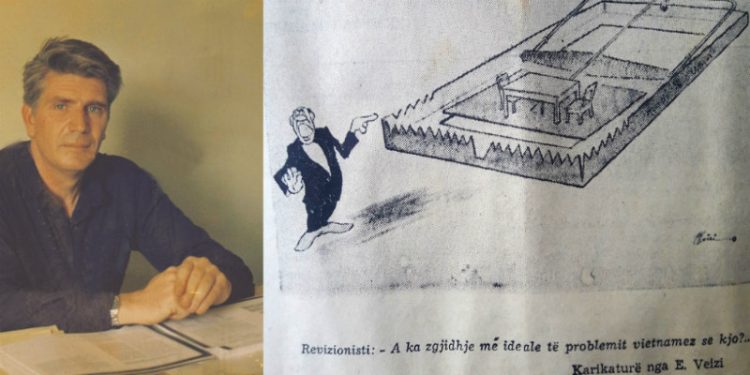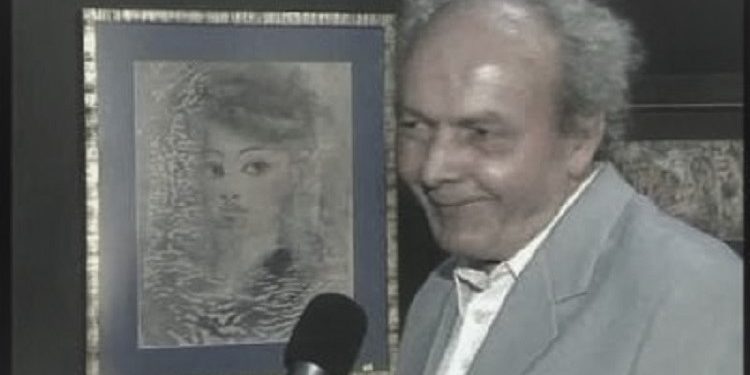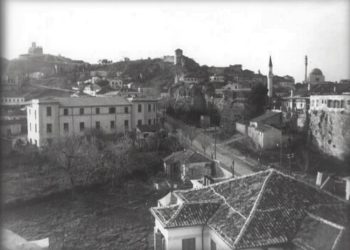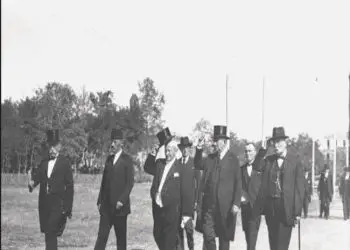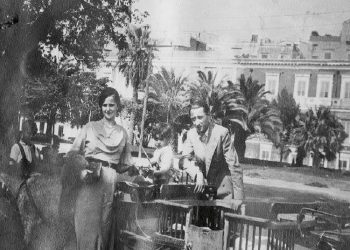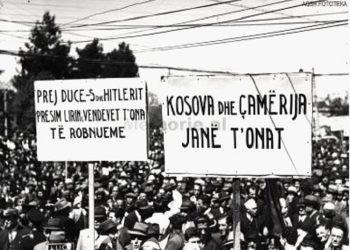From Visar Zhiti
The tenth part
Memory boards and bags…!
Continues from last issue
OTHER ARTS IN PRISON: “OPERATIC MUSIC”
Ethnomusicologist Ramadan Sokoli (1920 – 2008)
The first Albanian ethnomusicologist – that’s what he was called. He was a musician and a writer…!
In Shkodra, he received his first lessons, letters and musical notes, and then in the state gymnasium, student and member of the city’s musical band. 16 years old he started composing and his songs gained anonymity over the years, being sung everywhere, in concerts and on radio broadcasts.
His family opposed the fascist occupation by participating in protests; his father was exiled to Bologna, Italy, while he himself received a scholarship to study in Florence, at the “Luigi Cherubini” Conservatory, for flute and composition. The conqueror was like that.
In Italy, he was associated with Albanian anti-fascist students, future heroes or future victims. As fascism capitulated and the war continued, Ramadan Sokoli returned in 1944 to his homeland, back to his birthplace, in Shkodër.
The victors arrest his brother as a legalist opponent, while during the Postriba Uprising, the first Anti-Communist Movement, in 1946, they arrest Ramadan and his father and sentence them to prison, one for four years and the other for two years. They are taken together with other slaves, professors, doctors, writers, etc., to the draining of the swamps. That’s where the fascination begins, he starts dealing with folklore… prison, and when he’s released, he’s taken from enemy to soldier. The fascination continued, he was drawn to music, anthropology.
They needed it. They took him to Tirana to work in the Army Ensemble, then in the Philharmonic Choir and then organizer of the Folk Song and Dance Festival. Yes, he was the “enemy” and when the “class war” got even worse, he was fired. After 1952, he was sometimes hired and sometimes fired again.
When teachers were needed at the Artistic Lyceum, friends intervened, Llazar Siliqi, etc., and assigned him to teach the subject of flute, musical folklore, harmony, history of music, theory of solfege, without being separated from him, “the music of anxiety and suffering”. They also took it to the High Institute of Arts, created the laboratories of musical instruments, etc., etc.
It was not shared with the studies started. He writes professional texts, they are also published in foreign languages, they were methods, platforms and studies… and in 1980, he was retired. Shostakovich’s late overture of silence, but backwards, pentagrams were the image of barbed wire…!
In the year of great changes, in 1991 he will be the co-author of the book “Musical Instruments of the Albanian People”.
I meet him one afternoon on a street in Tirana near his house. I was already an opposition journalist. He couldn’t help but be in love with me, I came from his pain, from the prisons. It was so heartfelt, full of kindness music.
What are you doing, professor, I asked him. I finished a study book with personalities of our history, he said, in the field of culture, since the early times. And how long it takes, I got curious. 16 centuries. Professor, this is the title of the book, “16 centuries”, to teach that Albania did not start with the communists.
And so the book came out, with that title.
When I saw him on the streets of Tirana, old and slow, full of mysterious dignity, he has 16 centuries behind him, I said to myself.
PAINTING IN PRISON:
Edison Gjergo (1939 – 1989)
He was only a painter and he was condemned as a painter. In his trial it was said: “…acting contrary to the Party’s policy, he made various paintings with reactionary content.
The defendant admitted before the court that he did not like the art of socialist realism and therefore propagated, praising the reactionary, modernist painters, Chagall, Picasso, etc., the defendant showed his hostility… even in his works who has done…”!
Absurdity and crime. Of those who sentenced him to 8 years in prison, in 1975. In April…! They condemned the painter’s April and the colors of that spring and the springs to come, but they had condemned all the springs since the Second World War.
The painter Edison Gjergo was sent to Spaçi prison, between the dark gray and black of hell and a disgust that he openly, but silently, showed for the dirty environment there, for others and himself. We pushed wagons together as slaves. He was the designer of the prison, but when he sometimes angered those in command, they put him in the mine for a few days. Punishment within the punishment…!
The painting on…,- I asked him. No, I only did a self-portrait.
“Epic of the morning stars”, it is more, – I asked again about his most famous work, for which he was condemned, a vision with dramatic principles, where in the center is a harpist, surrounded by partisans with weapons on shoulder. The memory of art as threatened. He had felt that he would be arrested and had hidden many pictures. They will have lost. I lost my paintings, my wife, my life, myself…!
Released in 1982 In Tirana. He works as a painter. The world had become even dirtier. After 7 years, as much as he did in prison, he dies in misery. In the artless misery of socialism…!
A young writer, Rudi Erebara, many years later, in another era, would publish a novel about him, “The Epic of the Morning Stars”.
Abstract, Ali Oseku
In the year when Albania was to be liberated, 1944, he was born. But what would be less would be freedom, and would even be punished for them…!
He is a painter of the Albanian school, and this one, from those who looked at Western art, when Albania was separated from the Socialist Camp. As a scenographer of Opera and Theater, he found occasion and introduced European modernity, this color and light emphasized the understandable, to mean the incomprehensible.
As a drama on dramas, the Fourth Plenum of the Party, 1973, appeared on the stage, the acts of punishment for authors and works, for readers and spectators.
Ali Oseku burned all his works by himself, coincidence saved two portraits, where do you know for what symbolism and secret order, that of the husband and the mother.
Ali Oseku is arrested and sent to Spaçi prison. Portrait of Enver Hoxha, they could not help him, on the contrary.
When they took me there, he would be released after three years in prison, 1979, but the fellow sufferers would talk to me about the painter in prison, “The Painter and the Inquisition”, there was also a film about El Greco. Have you seen? I see.
Until the communist empire fell, Ali Oseku worked as a manual worker. Then his exhibition would start, abstract art, one color with some sudden intervention, with cycles as continuations.
He seeks the sublime calm that he finds in the tracks, in the trees, in the rain, in the mushrooms, in the road…!
His exhibitions will go to the capitals of Europe, in Austria, Germany, Belgium, Croatia, Italy, France, even across the ocean, in Boston and New York… and will be awarded with prizes.
The abstraction of his art is also what lies behind fate.
Cartoonist, Enriko Veizi, (1939 – 1993)
Chairman of the League of Writers and Artists of Fier, a branch of that of Albania, but Enriko Veizi was a talented engineer and painter, caricaturist with recognition abroad.
Himarjot, from a family of teachers, who lived in Vlora. Enriku finished high school with flying colors and his passion was the arts, but those who could go to university were assigned by the party where they could study. He also graduated excellently in Geological Engineering and was appointed to Fier.
He studied foreign scientific literature, collaborated with Chinese, Algerian engineers, etc., they made him deputy director of the Geological Institute, but he also continued his passion for art.
His caricatures were well received, published in the humorous magazine “Hosteni” and sent to exhibitions around Europe, but not the author, in Romania, Turkey, Greece and Germany, etc. He was also illustrating children’s books. Meanwhile, at work as an engineer, seeking to put to use the new world science, make him a true scientist.
And then when he was not believed, he was arrested on the charge of “saboteur in the oil sector”. Socialist Albania had serious crises in the economy, but not in enemies.
And exactly in the Patos of the oil, in the new palace of culture, in the hall with 600 seats, full of guests, I was also there, says Qemal Agaj, a native of Vlonia, I watched with anxiety, I had a bad biography, the fugitive father, they removed me as a designer, where to hide, when they bring the “hostile oil group” in handcuffs.
Pale, like a ghost…! Court-theatre. Absurd, tragic anti-comedy. Accusations-dialogues, more terrible than in Ionescu. Of course, there would be punishments by firing squad. Here, someone called: on the rope! Others followed. It seemed as if the walls were going to fall and take us under them.
Engineer Enriko Veiz is sentenced to 23 years in prison, that’s what the Party needed from him now. His eyes were tired. Maybe it all seemed like a serious caricature. They take him to Spaç, Burrel, Saranda… like a prisoner he looked at the sea of his childhood. “Yes, the sea can be imprisoned”, I wrote in one of my poems in prison?
The 90s came, big changes in the world, communism falls, and Albania is forced to change. All political prisoners are released. Enriko Veizi comes out in 1991. He returns to oil and caricature with pleasure. They also elect him as the chairman of the Fier Municipal Council. He was laughing.
That’s how he was, smiling, even when I met him in Fier, I went as a journalist of the allowed opposition. Two fellow sufferers, we deserved a cheap coffee. It looked like his hands were restless; didn’t he want to draw a cartoon again? Where, on the book, on the newspaper, on the coffee table in the club?
I turned my head, looked out the window. What was going on? Enthusiasm, persecuted and persecutors together, cheered the changes. Were these caricatures of democracy and freedom? Who made them? And Enriko Veizi decided to die quickly. And not only him…!
Painter and poet Sadri Ahmeti (1939 – 2010)
Escaped from Montenegro. Dreamer of the homeland and the adventure of freedom as a poet and painter, as a young man who, when he was 18 years old, in the second year of high school, crosses the border, through bullets. He and his three brothers, together, left their birthplace, the plateau of Vuthaj, and in the fall of 1957, they went to Albania, where they worshiped.
“Tito’s Yugoslavia” had become heavy, they, their family, Albanians in general were traditionally oppressed, so they said, after the border guards caught them in the charming Valbona and, when from the border post, they started for Tirana, straight to prison, where they would undergo a difficult interrogation.
They were told that they had to be “despicable agents of the UDB”, of the Yugoslav Security. The 4 brothers, badly surprised, did not accept they had run away from them, not knowing that there was much, much worse.
They are taken to exile in Llakatund in Vlora. Hundreds of other Kosovar Albanians, who escaped and were treated as foreigners, were kept there, guarded by armed policemen, and appealed three times a day.
Sadriu is suddenly removed after a year and taken to Kamas, to study at the two-year Agricultural School, which he did not even ask for. Life seemed like a crazy joke. He finishes school, but he had to go where the Party assigned him In Barat. Yes, and there almost as an exile, since he was not supposed to move from the city without the permission of the Department of Internal Affairs.
Could he write poetry without permission? He lived in the neighborhood, badly, and wrote the poem “The huts are cold”. They published it in the newspaper “Drita”, that they thought he was talking about the bitter past or about the undeveloped capitalist and revisionist countries, but when they clarified who the author was and where, even without Albanian citizenship, he was denied the right to publication.
And Sadriu writes the next poem, “Between me and the sun”. He continued to write, managed to publish, but under a different name. Buzagaz was making fun of life.
They send him to the Kruja district as an agronomist. But he drew quite beautifully, they needed a painter there and he worked as such until 1970.
The wind of liberalism was blowing a little, that famous year came, when the class war softened a bit, Enveri was in bed sick, having a heart attack, and foreign songs, Italian, English, etc., were being heard on the radio.
Sadri Ahmeti goes to the High Institute of Arts, he will study painting. Instead of meeting with lecturers, from the beginning those from the State Security asked him for written testimony about those he knew, what they say “against”. They gave him a fixed 70 page paper form, which he had to fill out; otherwise his studies would be interrupted. And he gave them, as he received them, white… like the shroud.
He was arrested in the city of “Studenti”. Serious investigator in Tirana prison. 300 days of questioning, coercion and accusations: “UDB agent. Hostile group…”! Meanwhile, the writer Kapllan Resuli, also a fugitive from Montenegro, was arrested, as well as another from Kosovo, Myrteza Bajraktari. Sadri had to write about both. And he wrote, he knew them, praise one and patriot for the other…! Maybe this saved them from being shot, but for Sadriu, the torture began…!
Military trial, that Sadriu would thus be announced as a dangerous foreign agent. Another charge was attached to him, that why he had said that the “Tivari Massacre”, the killing of thousands of nationalist Albanians, was done by Tito in agreement with Enver, when, the head of the court shouted, it was done by the shot minister of the interior, Koxi Xoxe. Good, said Sadriu, I didn’t know anything at all, now I found out who did it seriously scoffed.
They sentenced him to 4 years in prison In Spač. In the mines of hell. He is released and again in exile, in Balëz of Elbasan. Miner again, from underground to quarry. And they removed him, took him to another place, to hard work, so that he would not make acquaintances and friendships. But this could not happen with the writer Musine Kokalari. Lady, interned in Rrëshen, after the prison. And Sadriu continues to write. When he thought that his name had been forgotten, he published some poems in the magazine “November” in 1982.
I was in prison, in Spaçi, which Sadri had left, “November” was coming to me, and I had paid for it with the sweat and blood of working in the mine, and Sadri Ahmet’s name in the magazine should have been someone else’s But no His. And the next arrest of Sadri Ahmeti was being prepared. And he wrote a long letter to the deputy dictator, Ramiza Ali, where he asked him to respect the rights of Albanian immigrants from Kosovo to Albania, some of whom were sent to prisons and exiles, and listed their names.
Fortunately, Enveri had sentenced the other Minister of the Interior, Kadri Hazbiu, to be shot, and that minister had called him a “nest of snakes” and Sadri Ahmeti, does not hold back but closes his letter by writing: “The building of the Ministry of the Interior should be completely demolished and its bricks should be thrown into the Adriatic Sea…”!
He laughed and he didn’t laugh. Apparently the arrest was postponed for another time. But the communist dictatorship was also pushed to the brink.
In 1991, Sadri Ahmeti, from working in the cement factory in Elbasan, fled to Tirana, even a student at the High Institute of Arts, graduated in painting and was 55 years old.
And he started publishing books one after the other, poems, prose, poems, about the “Massacre of Tivar”, about the prison of Golio Otoku, etc., and opens painting exhibitions not only in the motherland, so bitter and so sweet, but and in Italy, Switzerland, Germany, etc. He is valued with prizes and one of his sons graduates from the same school of his father, also for painting.
We met from time to time. He was joking. Mayakovsky used to say that poetry is a bomb and a flag. Here, the flag was replaced with a towel. What about the bomb? “Cloud with pants”, but not Mayakovsky’s…!
One of the titles of his books is: “A laugh escapes through the darkness”. And Sadri Ahmeti remains like this forever…! Memorie.al
The next issue follows




